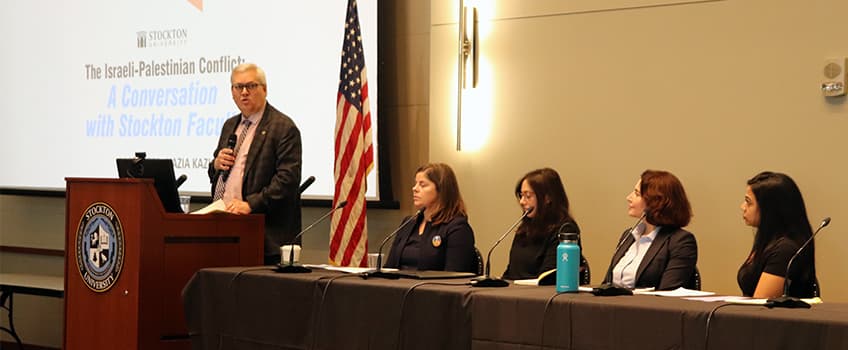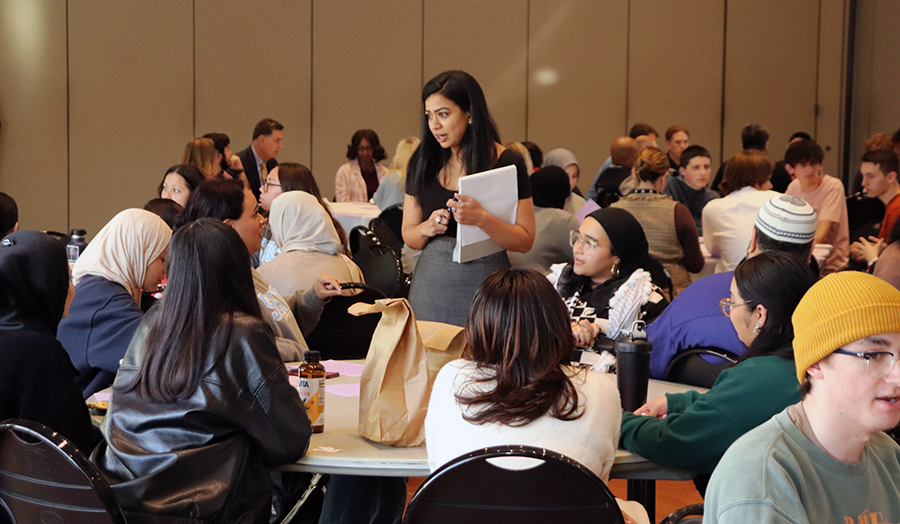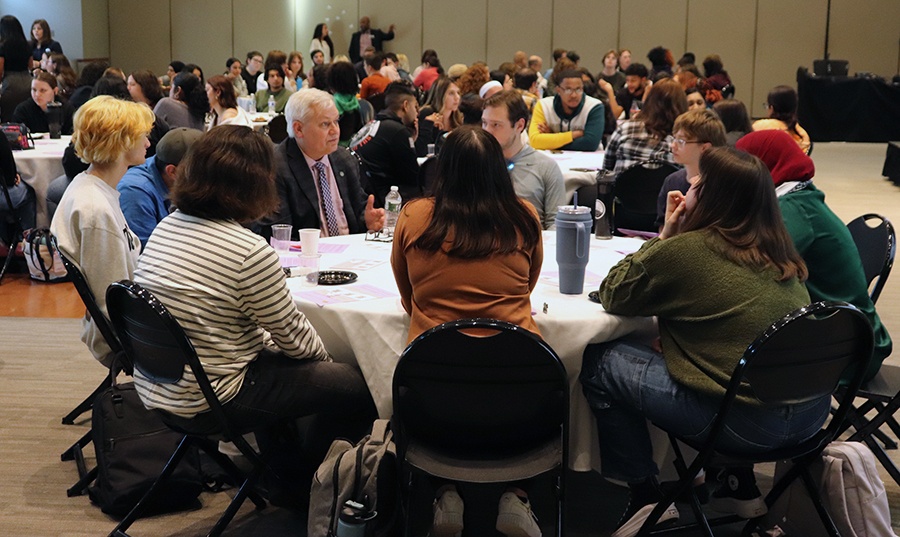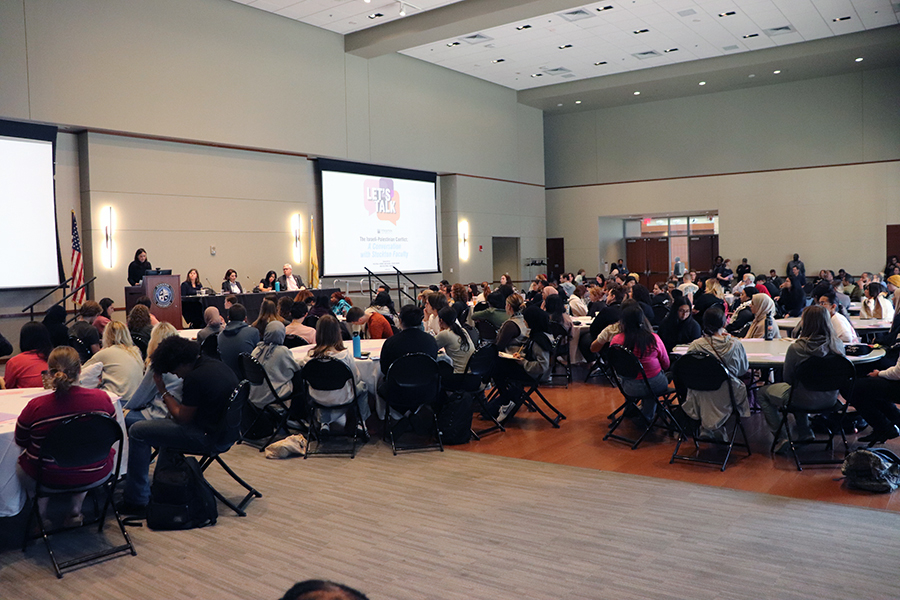Panel Urges Students to Use Critical Thinking on Middle East Conflict

Michael Hayse, associate professor of History, talks to a group of about 200 students, staff and faculty during a panel discussion titled 'The Israeli-Palestinian Conflict: A Conversation with Stockton Faculty.' He's joined by, from left, Tina Zappile, Lauren Balasco, Ghaidaa Hetou and Nazia Kazi.
Galloway, N.J. — Nearly all of the approximately 200 people who gathered in the Campus Center Event Room on Oct. 25 agreed that the Israeli-Palestinian conflict is an emotional and difficult issue to talk about.
But a panel of four Stockton University faculty members said to the crowd of mostly students that it’s important to discuss such a contentious issue, develop your critical thinking skills about it and, most importantly, help create a “community of care” on campus going forward.
“I want to challenge all of you to consider what that looks like for you and to exercise respect for each other in this room,” said Tina Zappile, associate professor of Political Science and the moderator for “The Israeli-Palestinian Conflict: A Conversation with Faculty.”
“I ask that we are patient with each other as we work through our emotional responses to what we might hear from the panelists and the peers at our tables. … I want to challenge you to avoid shutting people down for showing their emotions,” Zappile added.
 Nazia Kazi, associate professor of Anthropology, talks with students after the panel
discussion.
Nazia Kazi, associate professor of Anthropology, talks with students after the panel
discussion.
Lauren Balasco, associate professor of Political Science, began the discussion. As the coordinator for Stockton’s Global Studies minor, she talked about how this conflict has become a global event.
“Foundational to Global Studies, especially to those of us who teach such courses here at Stockton, is a commitment to — and understanding of — the diverse communities within our world, as well as the interdependence and interconnectedness of human societies.”
Balasco recognized how difficult it is to discuss the conflict: “I know that a lot of us feel pain and fear when terrorism and state violence prevail over human rights and humanitarianism.”
But she stressed that having discussions like the panel are vitally important.
“Coming together and engaging in these types of discussions is not only educational, it is foundational to strengthen democratic values and live in peace,” she said. “So for us to be here today may look like just an ordinary act of academic inquiry, but it is also a radical act of democracy in action.”
Balasco was followed by Ghaidaa Hetou, an adjunct professor of Political Science, who provided the audience with some historical context of the conflict.
“History is important. It gives us a great background knowledge on how this event developed, knowing that the cycles of violence have gone on for centuries,” she said, adding that a lot of the conflict’s roots can be traced back to promises made by the British to create homelands for both Arabs and Jews in the region.
Associate Professor of History Michael Hayse, who’s a historian of modern Europe and the Holocaust, talked specifically about the most recent conflict, including the terrorist attack by Hamas on Oct. 7 and Israel’s response by bombing the Gaza Strip and blocking food, water and medical supplies.
“It is imperative that any discussion begin by recognizing the surprise attack on Israel as terrorism,” Hayse said. “Of course, there is a deeper and broader context to the attack and the war, including Israeli occupation policies in the West Bank and Gaza Strip.”
 Michael Hayse, associate professor of History, sits with several students to discuss
what they heard after the panel discussion.
Michael Hayse, associate professor of History, sits with several students to discuss
what they heard after the panel discussion.
Hayse added that he takes strong issue with the responses to recent events that imply that Israeli policies and the plight of Palestinians in any way justify the Hamas militants’ brutal attack.
“But like many of you, I am distraught over the plight of Palestinian civilians who are victims of the Israel response,” he said. “In addition to those killed by Israeli military strikes, the blockade into Gaza threatens an even wider humanitarian catastrophe. … I stand with many other friends of Israel that an invasion of Gaza would bring only suffering and deepen the crisis.”
Hayse also said there have been horrific statements on both sides of the issue that have inflamed the situation.
“But we must resist the temptation to cherry pick outrageous and extreme statements as representing either Israelis or Palestinians as a whole,” he said.
Using critical thinking to closely examine and discuss what we are seeing and reading about the conflict was one of the main talking points of the panel’s final speaker — Nazia Kazi, an associate professor of Anthropology.
“A very strange thing happens in moments of heightened militarism in the United States where we are asked and we are ordered to switch off our brains,” she said. “I want to argue today that not doing that, that using our critical thinking skills is perhaps one of the greatest acts of compassion.”
Kazi detailed several stories that she said have not been reported by mainstream media that show a bias against Palestinians, and other stories about Palestinian peace efforts that have gone unreported. She urged the students to question why that is.
“How it is you know what you know, and what determines the things that you don’t know,” she said. “What shapes your knowledge and what are the major collective blind spots that we share as a society?”
After each of the panelists’ talks, the students seated as several tables were provided with questions to encourage discussion about what they had just heard and their own thoughts on the Israeli-Palestinian conflict.
Political Science major Bella Piper echoed Kazi’s point about getting one’s news from many different and diverse sources.
“Often, we form our own perspective from what we see on social media and the news, but in these cases, it’s very, very important to consider other perspectives. I think professors Hetou and Kazi did a great job analyzing both the conflict and the historical context, which was very much needed,” said the Toms River native.
 More than 200 people gathered in the Campus Center Event Room to listen to the panelists.
More than 200 people gathered in the Campus Center Event Room to listen to the panelists.
Kazi’s message also resonated with first-year Milette Collazo, of Hammonton, who said she hopes to continue discussions about the conflict in her classrooms.
“I liked the critical thinking aspect from Dr. Kazi. I thought it was very beneficial for us to sit back and just think about what we are seeing and reading,” said the Literature major. “I thought it was very beneficial on both sides, but I felt like more things could have been brought up and discussed without going around in circles about it.”
Political Science major Rob Romano wants to teach middle school history, and he immediately recognized how this is a hot-button topic that he hopes continues to be discussed.
“I like how they talked about the history of it and also the idea of critically examining what governments will tell you because they want to often tell you things they want because that’s how history works. History is written by the victor,” said the senior from Manahawkin. “We live in this age of vast misinformation, so it’s kind of important for us to think, ‘Why are they telling us this? What do they gain from this?’”
Sustainability major Susanna Cooke was just glad to have the opportunity to learn more about current events.
“A lot of people have been confused, hurt, angry and everything in between, so I’m glad that they gave us this resource to hear from different professionals and experts,” said the Collingswood native. “I understand that, with the time constraints of the event, there was a lot that they couldn’t touch on, but it was still very helpful. People are maybe leaving with more questions than they came with, but I think that might be a good thing.”
-- Story by Mark Melhorn and Loukaia Taylor. Photos by Mark Melhorn


